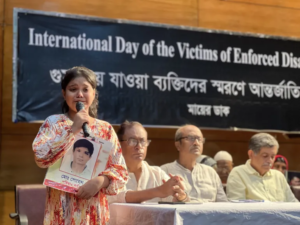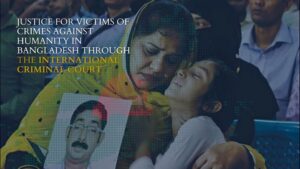by R Chowdhury 3 September 2023

Safa, 8, cries as she pleads for the return of her father Sohail, an opposition activist (Al Jazeera)
International rights, justice, humanitarian and social groups keep hammering the government of Prime Minister Sheikh Hasina of Bangladesh to stop victimizing political opponents and ensuring compliance with the acceptable standards of human rights, democracy, justice and good governance. The regime remains defiant, however, and continues its autocratic ways to forcibly stick to the power. A few forceful recent global moves are noteworthy. Let me start with the latest.
Enforced Disappearance
The growth of widespread unlawful disappearance in repressive regimes forced the United Nations to adopt in 2011 the resolution to observe the International Day of the Victims of Enforced Disappearance on August 30 each year.
The day has a special connotation in Bangladesh, where it became a tool of repression on political opposition aiming at prolonging the longevity of the authoritarian rule. According to Odhikar, a leading local human rights organization, more than 600 people have been unlawfully disappeared by security forces of the Sheikh Hasina administration, which is illegally in power—without people’s mandate– since 2009. Thousands of people, including minors, are languishing in jails under the detested Digital Security Act (DSA) for such “offenses” as criticizing the government policy or its rampant corruption, or even writing a parody line on the ruling family. In most cases, the missing persons are not seen again. In a few cases, their mutilated or bullet riddled dead bodies are discovered subsequently; some of them receiving the color of victims in crossfires. Yet, some are later touted to be terrorists or Islamic militants. Victims often suffer collateral abuses, such as, sexual, molestation, torture, extortion and denial to proper trial. The notorious Rapid Action Battalion (RAB) is blamed for most of the illegal abductions.
Additionally, the security forces continued to harass the families of the victims to withdraw their complaints or sign prepared statements exonerating the government forces. The ruling party activists even tried to assault US Ambassador Peter Haas when he visited one of the victims’ families in Dhaka in December 2022. The regime is refusing to work with the United Nations Working Group to investigate the enforced disappearances.
In a statement on the occasion this year, the United Nations condemned enforced disappearance as a grave and flagrant violation of human rights and fundamental freedom. “Families and societies have the right to know the truth about what happened” to their loved ones, said Antonio Guterres, Secretary-General of the UN, further adding that the member nations must fulfill their responsibilities.
Amnesty International (AI), Human Rights Watch (HRW) and dozens of other rights groups descended heavily on the administration of Hasina on August 30, 2023 demanding an end to the criminalization of the practice of enforced disappearances. They also called upon the government to ensure truth, justice and reparations for the victims and their families. “The authorities must immediately stop repression on peoples’ peaceful exercise of rights to freedom of expression and peaceful assembly,” urged the AI.
“Members of a death squad (RAB) should not be deployed in the UN peacekeeping missions abroad,” urged Brad Adams of the HRW on August 30, 2023.
The US Chapter of the AI urged its government on the Enforced Disappearance Day to hold Bangladesh accountable for its “obligation to the (UN) Human Rights Council.” It also asked its Congress to ensure that the “US does its part to stop the devastating crime of enforced disappearance in Bangladesh.”
On this day, 12 leading international rights groups that included Odhikar and Maayer Daak, an organization of victims’ families of Bangladesh, issued a Joint Statement urging the Bangladesh government that it “must cease enforced disappearances, stop harassment of the victims’ families and hold perpetrators accountable.” The signatories to statement included Anti-Death Penalty Asia Network (ADPAN), Asian Federation Against Involuntary Disappearances (AFAD), Asian Forum for Human Rights and Development (FORUM-ASIA), Asian Human Rights Commission (AHRC), Capital Punishment Justice Project (CPJP), International Coalition Against Enforced Disappearances (ICAED), International Federation for Human Rights (FIDH), Eleos Justice, Monash University, Maayer Daak, Odhikar, Robert Kennedy Human Rights and World Organization Against Torture (OMCT).
The US based Coalition for Human Rights & Democracy in Bangladesh (CHRD Bangladesh) also issued a statement on August 31, 2023 condemning the enforced disappearances of hundreds, mostly opposition political activists, in Bangladesh under the Hasina administration. It also demanded that the whereabouts of the victims be intimated and they be returned to their families at the earliest.
In the run up to the national election due in January 2024, the Hasina regime has in fact intensified its spate of repression, including abductions and short time detentions targeting the political opposition, independent media and journalists, and civil society activists. The government is doggedly pursuing to host another farcical and fraudulent election to rival the ones it orchestrated in 2014 and 2018 that brought home almost 100% victory for the ruling candidates. The repeated international calls for a free, fair and participatory election, as well as freedom of political activities in the country fall on deaf ears. The opposition is campaigning for the election to be held under a neutral, non-partisan Caretaker Government, without which it will not go to polls. A group of leading US Congressmen also urged the UN to arrange the next Bangladesh election under a neutral authority.
Open Letter on Professor Yunus
On August 28, 2023, more than 176 global leaders, 104 of them Nobel Laureates, sent out an Open Letter to Prime Minister Sheikh Hasina against the political victimization of Professor Muhammad Yunus. It is the largest diplomatic yet scathing pressure and concern of the international community against the Hasina regime’s political vengeance against the Bangladeshi Nobel Laureate in particular, and her human rights violations in the country in general.
The signatories to the letter included former US President Barack Obama, former US Secretary of State Hillary Clinton, former UN Secretary General Ban Ki-Moon, former President of Ireland Mary Robinson, President of East Timor Jose Ramos-Horta, and Nobel Laureates Albert Arnold Gore Jr (peace), Orhan Pamuk (literature), Harvey J Alter (medicine) and others.
Earlier, President Obama issued a letter in support of Professor Yunus. Secretary Clinton also issued a personal appeal for all to support the Bangladeshi Nobel Laureate.
Professor Yunus earned global admiration for his innovative Grameen Bank program which extends micro credits to mostly rural poor to invest in small businesses. Experimenting since 1974, Professor Yunus founded the Grameen Bank (GB) in 1983 aimed at extending small loans to borrowers with no collateral. Rural women form the bulk–96%–of the nearly nine million of its customers. The interest rate is usually higher than normal banking rates (because the bank involves itself in the investment and profitability process. In fact, the rate has a few layers, the lowest being zero), yet the repayment hits as high as 98% and never going below 90%, whereas the scheduled banks usually achieve about 45% and mostly suffer from serious loan defaults to the tune of millions of dollars. The bank’s success in lifting people out of poverty led to similar micro-financing efforts in many other countries. Professor Yunus and his Grameen Bank won the Nobel Prize in 2006.
The leaders write, “This letter attempts to build upon an earlier appeal of March 2023 to you by 40 global leaders who were concerned about his safety and freedom.” According to Sam Daley-Harris, the founder of the US-based Civic Courage and the anti-poverty RESULT, “the attacks on Muhammad Yunus are what you’d expect from an authoritarian government. When a government controls all the levels of power, the media, the courts, and the parliament, it does whatever it can to stay in power.”
“We write to you as Nobel Prize laureates, elected officials, and business and civil society leaders, and as friends of Bangladesh. However, we are deeply concerned by the threats to democracy and human rights that we have observed in Bangladesh recently,” reads the letter. In addition to suspending all judicial proceedings against Professor Yunus and resolving the cases through impartial, and possibly international judges, the letter also urges the Hasina regime to ensure a free, fair, and participatory national election that is due soon. The letter concludes with a stern warning, “We will join with millions of concerned citizens around the world in closely tracking how these matters are resolved in the days ahead.”
The CHRD Bangladesh also expressed its full support to the Open Letter, further urging the Hasina government to drop all politically motivated cases against Professor Yunus and others, and honor internationally recognized standards of human rights and democracy for the people in Bangladesh.
Some analysts suggest that Hasina’s culpable attacks on Yunus are borne out of her concern, if not hatred, for the fact that the latter far out-shadowed the international stature of Sheikh Mujibur Rahman, Hasina’s father.
In addition, two very important developments are noticeable lately. That Bangladesh under Prime Minister Sheikh Hasina is the worst playground for human rights violations and flaunted democracy is globally acknowledged. International rights and democracy organizations have been crying foul for decades but with no avail. The perpetrators of rights violations not only continued their tasks unabated, but many were rewarded too. The US sanctions on the RAB in December 2021 brought little or no improvement. In fact, abuses continued, at times with increased ferocity, as if in defiance and vengeance against the sanctions.
The Guernica 37

The Guernica 37 (G 37) Launches Initiative for Justice and Accountability in Bangladesh. It is a platform to collect materials and evidence of human rights abuses to be presented to the International Criminal Court (ICC) in the Hague for investigation and justice. (The name derives from the war crimes committed by Germany and Italy in the Spanish town of Guernica town in 1937, killing more than 1600 civilians. Number thirty-seven denotes the number of offices it has established globally, the head office being in London with major outfits in San Francisco and Madrid).
The G 37 has been documenting state organized serious abuses of human rights largely against the civilian population by interacting with people in civil society in Bangladesh and the diaspora. It is in continuation of G 37’s earlier submission to the ICC in 2014. Apparently, it has already collected 101 pieces of evidence against the Hasina regime with verifiable references. (Perhaps this is the list: Sheikh_Hasina_Century of Misdeeds.docx – Microsoft Word Online (live.com)
Its report cover the involvement of senior members of the Awami administration, Directorate General of Forces Intelligence (DGFI), Rapid Action Battalion (RAB), National Security Intelligence “NSI), National Telecommunications Center (NTMC), Bangladesh Police, and the Border Guards Bangladesh (BGB), who were and are in the effective control over the political and police action in Bangladesh.
The scope of investigation will include unlawful detentions, torture in custody, extrajudicial killings, enforced disappearances, and all other crimes within the jurisdiction. G 37 considers that such crimes are systematic and “part of state policy, and thereby amount to crime against humanity.”
Human Rights in Bangladesh: An Update
On August 15, 2023 a group of experts from a wide-ranging rights organization that included Asian Human Rights Commission (AHRC), Robert F Kennedy Human Rights, Human Rights Watch (HRW), The US Institute of Peace, the Law Library of the US Congress and others held a seminar in Washington to collect and update information on various Human Right violations, including the Enforced Disappearance, Blasphemy Laws and Threat to Freedom of Expression, Challenge to Minority and other burning issue in Bangladesh.
The Regime Remains Defiant
Salvos of pressure continue, yet Prime Minister Sheikh Hasina remains defiant and undaunted. She dismissed all these warnings and continued her authoritarian rule and repression against the political opposition in particular and the people in general, more so as the national election closed in.
________________________________________________________________________
Writer is a former freedom fighter of Bangladesh. Authored five books and co-authored seven. A new book is in the pipeline. Prolific writer in the media on contemporary Bangladeshi issues.
